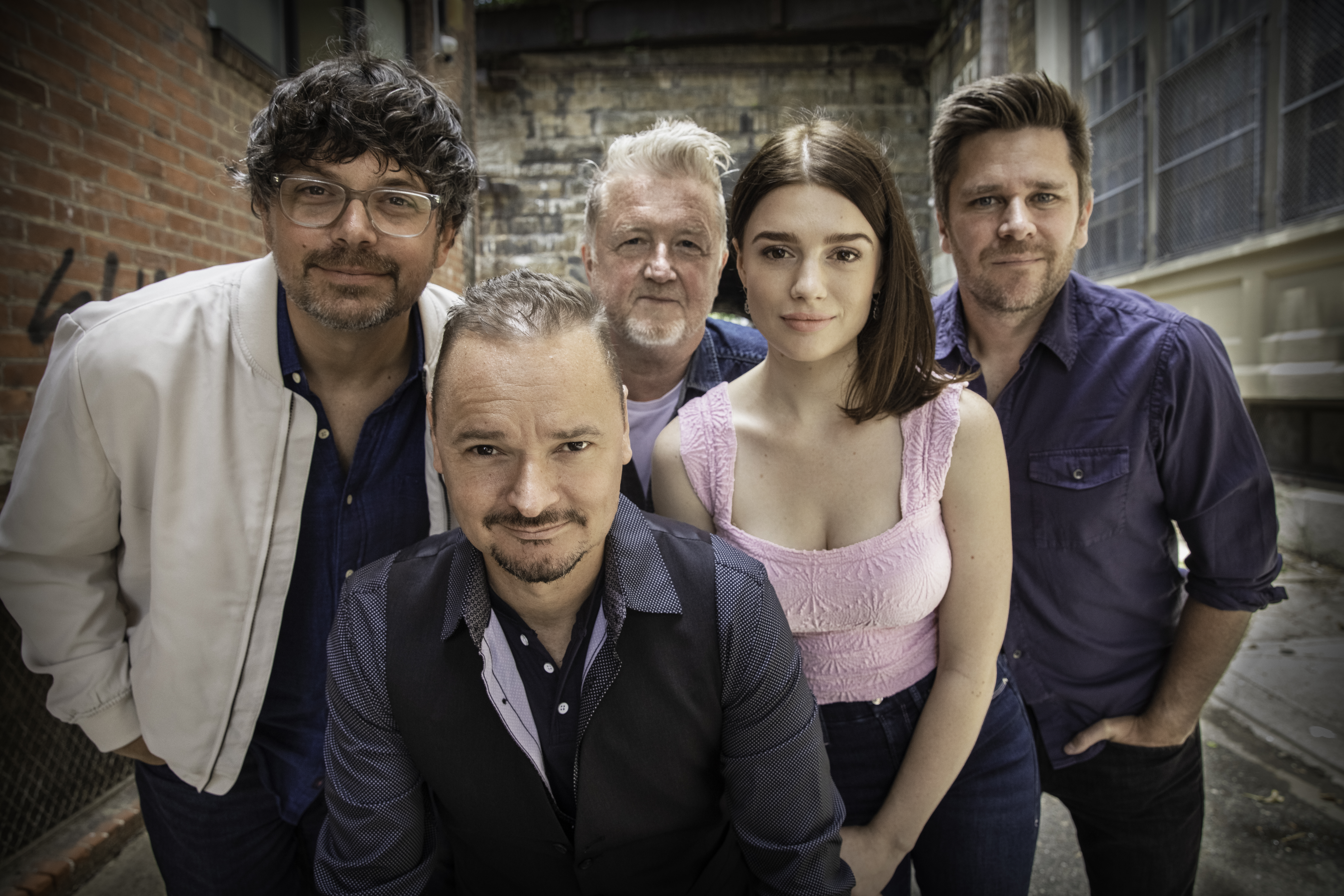There’s a curious way in which a musician or a band’s rise or struggle is often coded into the music, inscribed in its DNA, from the Midwest working class country-punk of Uncle Tupelo, to the Southern small-town camaraderie of R.E.M. to the East Coast prep school precociousness of Vampire Weekend. For the Santa Monica-based U.K. expats of Celtic rockers Gaelic Storm, it’s the way a loose confederation became a family in pursuit of joy.
The band’s very existence is owed to the roulette-like grind of bands on Los Angeles’ Sunset Strip doing the label contract hustle. Singer/guitarist Steve Twigger had been chasing that elusive major label golden ticket with his new wave band the Woodies in the mid-nineties, and was looking for something different when he wandered into O’Brien’s Pub.
“We would rehearse four times a week, do showcase gigs on Sunset Boulevard, at the Central, which is now the Viper Room, Club Lingerie and the Roxy. We would play every couple of weeks, and we were building up a following. We almost got signed. We were very close. We had eight labels coming to see us on a regular basis,” Twigger says. “We had fun doing it, but that sort of imploded and then I bumped into the guys at the pub and I’m like, ‘Can we just play for the sheer fun of it?’”
Freed for a moment from their ambitions, the authentic love of music came out, more honest than any try-hard rock anthem.
“That’s when things started to happen for us, when I basically listened to my soul, and just played for the sheer absolute enjoyment of it,” he says, as they push into their 27th year. “There’s a purity to it. People can see it, you know? They can see your emotions, and I think it comes through the music. What’s amazing about music when it’s done with a good heart is that emotion just lives in the song. You can tap into that and just bring it to life again.”
Karma’s personal congratulations came in the form of James Cameron’s musical director for the film Titanic, who had popped into a Los Angeles Irish music fest early in the day to look around and get a hold of the schedule. The fellow was on his way out when he heard a tremendous clamor across the field. For their part, the band felt screwed by the 1 pm. show slot on the far-flung hay bale stage near the exit, but fortune has its ways.
“At the time there were a couple of members of another band who got on stage with us. They were Irish Wolfhounds wandering across the front of the stage and there were people dancing,” Twigger recalls. “We were still hungover or partially drunk from the night before, and just having a riot. He saw this mayhem happen, and he’s like, ‘What on earth is this?’ and gave us his card.”
They became the loose-limbed leaders of the steerage hootenanny in Titanic, which Twigger gives Cameron’s assistant credit for – they were looking for a loose federation of musicians playing like they just met and were having a blast, when in fact the members of Gaelic Storm had just met a few months earlier.
“That rawness. The looseness of it. And the sheer exuberance is what they needed for that theme. He was a very astute observer to realize that this was the real deal,” Twigger says. “It was the music that people would have been made if they just sort of met with their instruments, and said, ‘Let’s just play somewhere and have a good time.’”
For his part, Twigger is from Coventry (home of My Fair Lady‘s Eliza Doolittle), a working class industrial area, and took advantage of his own golden ticket, putting away his guitar for six years of higher education, winding up an art director working on Hollywood movie posters, before returning to his musical love. When their ship came in, he and singer/accordion player Patrick Murphy made a pact.
“We have tried to keep it as pure as possible – all the way through our career on the road,” he says. “Patrick Murphy and myself made a promise to each other that the day it stops being fun is the day we will stop playing. And here we are still doing it. That’s both cause and effect, because we know that we want to keep going, so we deliberately keep the fun in it.”
The fortune of living in Coventry was that it was also where all the overseas workers lived. During this time Twigger fell in love with the dub and two-tone sound of Jamaican immigrants that fueled the ska movement of the time. Twigger connects that moment and movement to what Gaelic Storm do.
“They latched on to this purity of expression that the ska movement brought with it, and carried on the traditions of that through their own sort of working class struggles,” Twigger says. “For me, the Irish music that I heard and grew up with around Coventry was deeply mired in my soul, and when I got together with the lads in Santa Monica, it was just pure joy, I didn’t even care if we were playing it the way it’s supposed to be played, or whether I played the right chords. It was just pure emotion for us. And that just translated directly to the audience.
“We feel like we bring the audience with us, and they in turn, then bring us with them,” he continues. “So it’s just a conduit to this other place and you’ve just got to let that flow. We try not to let ourselves get in between that and the music and those moments.”
After three albums of rambunctious folk-rock and traditional Irish folk with Higher Octave, they struck out on their own in 2004 and that’s how it’s been for two decades, outside of a brief one-off for indie label Megaforce (2006’s Bring Your Wellies). This too became part of their whole self-sufficient, music-serving ethos.
“It was a pivotal moment for us. We were almost days out, certainly weeks out of going into a recording session that we had booked, and the money was just not coming through for it, and we were talking to our management,” Twigger recalls. “Then we sort of go, ‘Well how much do you have? How much do you have?’ We could just about do this and fund it ourselves. ‘Why have we not done this before?’ And we were truly independent from that day on. It really helped us. we’re very hands-on people anyway. I produce the albums. I do the artwork for the albums. Pat does the finances. We try to keep everything in-house.”
That approach has sustained them. They bought their own sprinter van and have been living off of touring money since the early days of file-sharing.
“Now everybody’s discovering it again, because they have to, you know? When it gets to streaming services … and of course, coming off the pandemic, everybody’s back on the road. And they’re like, ‘Oh my god, this is this the way to make money!’ and we’re like, ‘Yeah, welcome to the circuit.”
Gaelic Storm had scheduled time to record their follow-up to 2017’s Go Climb a Tree when the pandemic hit. It not only sidelined the band’s album plans it did a number on Twigger’s psyche. When we all emerged, Twigger found himself leaning on his mates, encouraging them to all get started writing for the next album while he attempted to recharge his batteries. Touring, you see, is the tonic.
“To be honest with you, after all the effort and the whole trauma of the pandemic, I was just empty. I was literally empty, and I told them, being the predominant songwriter and a producer sort of focuses me a little bit. I’m like, guys, ‘I gotta go out and get the love of playing music back into my soul.’ Since then we’ve been in the studio, we’ve got songs in the can. We’ve got more to be working on. We’ll be introducing some new stuff imminently. Honestly, I really needed that audience to give me my kind of soul back again, and they have. It’s been beautifully healing being back on the road.”
Gaelic Storm, Sunday, June 11, at the Greenwich Odeum, 6 p.m. door, 7 p.m. show. $35-$45. 59 Main St., East Greenwich; 401-885-4000; www.greenwichodeum.com.
Chris Parker is a freelance journalist (The Guardian, Undark, Daily Beast, Billboard) and author of the book, King James Brings The Land a Crown, about the Cleveland Cavaliers’ 2016 championship. He lives in Providence.






 Subscribe
Subscribe